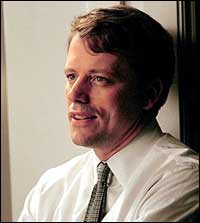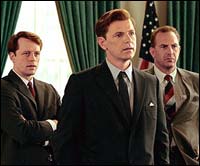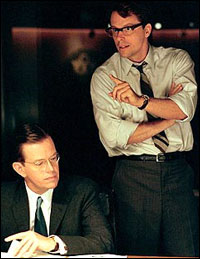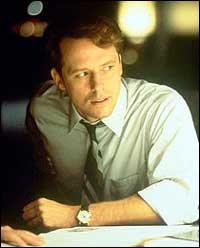Walking in a Giant Shadow
Steven Culp fills Robert Kennedy's shoes in the tense, Cold War drama "Thirteen Days."
(c) Reel.com
January 10, 2001
By Pam Grady
In San Francisco recently to promote "Thirteen Days," the personable Culp sat down to talk to Reel about making the film and the hard work that went into preparing to play a historical figure. Q: It seemed like you and Bruce Greenwood handled the Boston accent better than Kevin Costner, but I'm still not sure if that's really true or if it was just that the accent sounded odd coming out of his mouth. Steven Culp: I think Kevin did a terrific job. When you see any big American movie star doing an accent, especially someone like Kevin, who sort of hearkens back to Gregory Peck or Gary Cooper, you spend five minutes going, "There's Gregory Peck, he doing an accent!" But it was really important for him — in fact, I found out later that he persuaded Roger to let him do it, because he wanted to get the feeling that these guys are the outsiders. They're the new kids; they're not necessarily respected or trusted by the establishment, and they're sort of set apart from everybody. And, actually, at that time, they were sort of known in the press as "the three brothers." And they used to call Kenny "the Cobra." He was the guy you had to get past to get to JFK. He was one of the people … it's interesting, because, when I first read the script, not knowing much, I thought, "Who's this guy? How come he's so important? What's the deal?" And, after doing some research and doing some reading, I realized, well, he was the guy — he was Bobby's roommate at Harvard; he'd been working for JFK since the earliest political campaigns — who said what he thought. He'd disagree with everybody else in the room, if he had a different viewpoint. And that's what they wanted. They wanted somebody around that they could trust, whose judgment they could trust, who they knew wasn't trying to say what they wanted to hear. And so then, when I went back to the script, I went, "Oh, well, now it makes sense." Q: What was it that intrigued you about the script when you first read it? SC: Well, what's not to like? It's an incredible story, really well written, and very moving, I think, aside from being very suspenseful. It's really inspiring, these imperfect men in government, who, at a time of crisis, transcend themselves, and become great men. I just think it's really incredible. And the characters themselves, they're like, the Kennedys, they're like great Shakespearean characters, they're so complex and multi-level, and there's just so much to draw upon. There was no objection to it. There was nothing not to like. Q: I read in the production notes that, when you were up for the part, you read one of Robert Kennedy's speeches. Was that your idea or was that something you were asked to do?
So, I did the screen test, and they said, "Don't worry, we just want to see" — because Bruce had already been cast — "we just want to see you and Bruce together." Because I'm actually just a little taller and a little broader than he is, and they wanted to see how it would work with us together, because Bobby was — you know, Jack is up here and Bobby's down here. I'm several inches taller than Bobby was, and they just wanted to see how it would work. "Don't worry about it. We might read one of the scenes, but you don't really have to do anything." I thought, "Yeah, a likely story." There was a speech of Bobby's. I had gotten this tape from a video store, "Robert Kennedy in His Own Words". It's a speech that he did the night that Martin Luther King, Jr. was killed, and it's an incredible speech, where he tells this black audience that he's talking to that Martin Luther King has been shot, and the crowd is just going crazy. It's so moving. By the end of the speech, they're applauding. He was just amazing. And I thought, "God, I should try to do the speech," but there was no time. There was no time to transcribe it from the tape and memorize it, and do all that stuff that I would need to do. But I was working on it; I'd listen to it in the car; I was working on it, just to try to get the accent and stuff. So, when they were doing my hair and making me up for the screen test, the research people came by and said, "We found this book; it might be interesting; there's speeches." I looked at it and there's the speech. So, when it was just me in the screen test, Roger Donaldson said — I said, "What should I do?" — "Say a few words." I said, "How about if I read this speech?" "Sure, go ahead." So, I read the speech. And Roger, at the end, goes, "That's a stroke of genius, mate." [Laughs] And Ilona Herzberg, one of the producers, said, "Oh God, we all got chills." And Army Bernstein, who's the head of Beacon [Pictures] and one of the producers — Bruce was getting made up in the other room at the time, he said, Army came walking, just going, "It's happening. It's happening." So, it was a great thing, but, even then, I had to wait two weeks before I got the final results, because they had to pass the tape around to everybody, Kevin and all the investors, and whatever. Q: I also read that you and Bruce Greenwood would call each other every day to work on your parts. SC: Not every day, but we did a lot of conversing, because, one thing we found is that people have this generalized idea about the Kennedy accent. And they do have this accent, but tonally, they're very far apart. Bobby is much higher and sort of more nasal than JFK, and what we found when we were auditioning, is that we would start drifting toward each other's accent and we'd start doing each other's voices. So, in the five weeks between the time I was cast and the time shooting started, we would call each other up to share our research, "What are you reading? What are you doing?" because we both involved in our own … I mean, I was working out with a trainer, because I'm actually a little taller than Bruce, so I got myself into this wiry, skinny, gaunt Bobby Kennedy body. I was doing teeth tests; I went through several different versions of the front teeth before we got the right size and shape. Hair tests. Wardrobe. Watching tapes, listening to tapes, reading books. And Bruce and I would call each other up on the phone and say, "What are you doing? What are you doing?" It was sort of competitive, in a way, but in a good way, but we would have the conversations in the accents, because we wanted to get comfortable doing them with each other and maintaining our own accent when we're talking to the other guy. So we would do what we called "dueling Kennedys," and see who would crack first. It was usually me. [Laughs] So, by the time we started shooting, we just hit the ground running, we already established relationship and there was a lot of mutual support and respect and trust there. And, also, I think we fell very easily into this very Kennedyesque badinage, because the brothers apparently — they didn't express affection. They expressed it through competition, through ribbing, through this sort of gallows humor that they had. We just fell very naturally into that. It was something we kept up on the set, a lot, and never really talked about it. I could sort of see that it was happening. I thought Bruce could see it, too, but we chose never to speak it, because we didn't want ruin it. But you could tell, the rest of the crew and everybody was really, "Oh God, here's the brothers." And then when Kevin showed up a week before, we were sitting around the table, going through the script, and he became the third brother. I was going to say it was very easy, but it's not like it was easy, but it was natural.
SC: My mom and my stepdad aren't around anymore to talk to, so … I talked with some people. I actually talked with Don Bellisario, who's the producer of "JAG" and talking with him sort of reminded me, because I had very vague memories, and it sort of triggered off some other stuff that I remembered. I talked with my uncle. I talked with my father to get a sense of the era, but there's so much material out there. There's so much to read, so much to watch. You really don't lack research material. I did have an opportunity. I had a friend who would have hooked me up with Rory Kennedy — Bobby's youngest daughter — who was born after he died. I just thought it would be very intrusive and it was right after John Jr. died. So, you didn't want to — there was enough out there. If I had thought it was a really pressing necessity, I would have done that, but people have been bugging them all their lives. Q: Did you have any opportunity to speak with [co-star and Kennedy nephew] Christopher Lawford? SC: Oh, I talked with Chris Lawford, yeah, and Kevin O'Donnell, who is one of the producers of the film, who is Ken O'Donnell's son. I did talk with them. They gave me childhood memories and stuff like that, but they were … it's good, because I'll never be able to objectively evaluate my own work. It's just impossible. I can look at Bruce and Kevin, "God, they're great," but me, if I can get through it without cringing, that's saying something. But the support that I got from Christopher and Kevin O'Donnell, you kind of felt like, "Well, you're on the right track. It's going well?" Q: Did you find it daunting to play Bobby Kennedy? There's the whole Kennedy mystique and the almost mythological status that he's attained in the years since his assassination, not to mention the many actors who have played him before you. SC: Well, I watched … I actually, I didn't want to wear the false teeth, and Roger persuaded me to do the false teeth, which was a great choice. Almost immediately, once I started using them, I thought, "Well, this is good." It's just that the first set I tried on were almost too big and exaggerated; they were like Bobby's teeth, but they were too big for my jaw. I did watch some other actors to see if they were wearing false teeth. [Laughs] That was mainly the reason. I saw Martin Sheen. I thought, "Well, he's good." But the one I saw, Kevin Anderson — Q: In Hoffa. SC: In "Hoffa," and I just went, "Oh, this is the guy to beat." He's really good. The other guys were good, too, but I was going, "Okay, that's good, that's fine." But then when I saw Kevin, I just went, "Oh, this is guy." He got my competitive fire up a little bit. And I thought, "Oh, set the bar high." There's always that feeling, especially when you've lobbied so hard to get a job, and you get the job, and there's always that second when you go, "Now, I have to do the job. Yikes!" [Laughs] And Bruce said — I talked to him the day after I got cast — "We qualified for the Olympics. Now we have to go to the Olympics." But there's really no time to be intimidated. There's really too much work to do, too much preparation in every way to try to get under your belt, before you even stepped on the set. So, there was really no time to be intimidated. Whenever I had an opportunity to stop and think about it, I just felt, "What a privilege. How fortunate I am. I'm one of the most fortunate actors on the planet right now to be in this movie and to play this extraordinary character. It's just so rich; there's just so much there." Q: How much preparation time did you really have? Did you have any rehearsals?
And then while we were shooting — we all started doing this almost independently of one another — if Bruce was off shooting this scene, and we were waiting, I would corral the other actors and start rehearsing the next scene while they were shooting that one. I would take his part and sort of lead discussions, and Kevin would do that. If there was a scene coming up in a couple of days, we would go off in a corner and work on it, so that, when we got to that scene and were ready to block and shoot it, we were ready to go. We did a lot of that. Q: One of the producers, I think it was Peter Almond, said they tried to make the White House look as authentic as possible, not just for the audience, but so that the actors might feel inspired by it. Did you find this to be true? SC: Yeah, yeah. I didn't realize it at the time, but having to talk about it this movie a lot, I'm starting to realize that one of Roger's methods … he spent a lot of time getting the cast exactly right and getting the look exactly right and getting everything set up in the exact perfect way. He started out in New Zealand as a documentary filmmaker and I think — I don't know, I don't know if this is true or not — but, I'm thinking that maybe one of his methods is to get the world really perfect. And get the cast perfect. And then set you out there and film it. He's already got in his head the type of film that he wants to make, but there's something documentary ... he wants to set you loose on the terrain and see what happens and film that. Q: Did the experience of making the film alter your political viewpoint at all? SC: I don't think so. No, no. I mean, it always alters your human viewpoint a little bit, I think. As I've said, it's very inspiring and it sort of shows you what human beings can be capable of, both in a really potentially destructive way, but also in a very human and constructive way, I think. You always … one of the reasons I like doing what I do is because when you do a really interesting job, you don't come out of it the same person. Your humanity has been affected by it, in some fashion. Q: Did it alter your view of Bobby Kennedy at all? SC: Well, it developed it, because I had a very superficial overview of him. You know, he was JFK's younger brother. He was tragically killed. He had the aura of Camelot about him and all that stuff. But I didn't really know what the components of that stuff were until I started digging into it, and just what a fascinating and contradictory character that he was. In Ken O'Donnell's book, — I think he's quoting somebody else — but he says that the best description of Bobby was that, "He was not a simple man. He was a great many simple men." And my other favorite quote was Schlesinger's, in his biography, talks about Bobby having an experiencing nature, "He was somebody was always in development, somebody who was always evolving into the next stage, growing and changing," I think, for the better. That's the way I'd like to live my life. He's very inspiring to look to. Q: What would you like people to take away from the experience of seeing "Thirteen Days"? SC: That's a tough question. There's so much there. I have to think about that. I don't really know how to answer that, unless it's not so much that I want you to come out with new respect for the Kennedys, but it is the point where these people become great. And they're not portrayed as saints in the film. They're human beings. They're extraordinary human beings, but they're human beings, who, in this time of crisis, transcend themselves and become great. And it's one of the reasons we remember them. Because they're portrayed as human beings, it means we all have the capacity, in a way, to transcend ourselves, to see the other point of view. Army Bernstein always used to talk about, in some films, it always leads up to the big battle, the big fight. This is an unusual story, in that it's about people trying not to fight, giving the other side room to back down with dignity, so we don't destroy each other. And I think there's something really noble about that. I hope people take away the capacity for nobility. |
DISCLAIMER: This site is a Steven Culp fan site and is not affiliated with Steven Culp, his family or any of his representatives.
Unless otherwise noted, all captures were made by me from videos from various sources. All shows and photos belong to their respective owners.
NO COPYRIGHT INFRINGEMENT INTENDED!
© 2004-2022 SConTV.com and Steven-Culp.com
Unless otherwise noted, all captures were made by me from videos from various sources. All shows and photos belong to their respective owners.
NO COPYRIGHT INFRINGEMENT INTENDED!
© 2004-2022 SConTV.com and Steven-Culp.com



